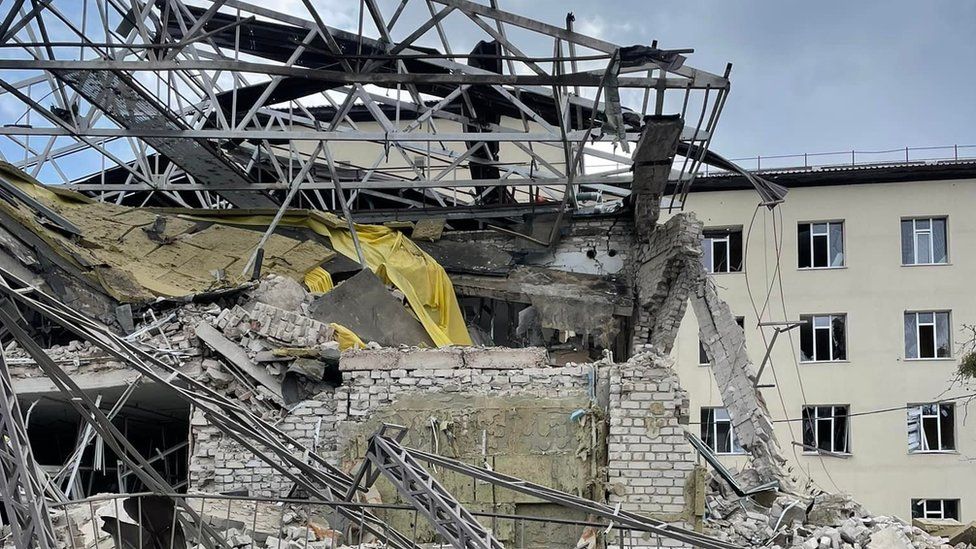Image source, Volodymyr Matsokin
There have been more than 70 separate attacks on hospitals, ambulances and doctors in Ukraine with the number increasing on a “daily basis”, says the World Health Organization (WHO).
It says the targeting of healthcare facilities has become part of the strategy and tactics of modern warfare.
A recent casualty on 8 March was the newly refurbished central hospital in Izyum, south of Kharkiv.
It was hit by what the Ukrainian authorities said were Russian shells.
Video and photos posted online by the city’s deputy mayor showed extensive damage to the main hospital building. A new reception area built last year was completely destroyed.
The footage has been verified by the BBC and other media outlets, although the exact circumstances of the attack are impossible to establish at this time.
“After the first bombing, the windows of the hospital blew out,” the deputy mayor Volodymyr Matsokin told the BBC.
A second attack destroyed the hospital’s operating rooms, he added.
That day hospital staff were treating children, pregnant women and three newborn babies as well as soldiers and civilians injured in fierce fighting in the region, according to the Ukrainian authorities.
They were sheltering in the basement at the time of the attack and no-one was killed.
“The government had invested millions to provide good facilities with modern equipment,” said Mr Matsokin.
“Patients had to climb out of the rubble on their own to escape.”
The BBC has contacted the Russian embassy in London about the attack but has received no response, although in the past Moscow has denied deliberately targeting civilians.
Since 24 February, the WHO has reviewed and verified 72 separate attacks on healthcare facilities in Ukraine causing at least 71 deaths and 37 injuries.

Image source, Google (l) and Volodymr Matsokin (r)
Most have damaged hospitals, medical transports and supply stores, but the WHO has also recorded the “probable” abduction or detention of healthcare staff and patients.
“We are concerned that this number is increasing daily,” the WHO’s Ukraine country representative Jarno Habicht told the BBC.
“Health facilities should be safe places for both doctors and nurses, but also patients to turn to for treatment. This should not happen.”
Because the war in Ukraine is an international armed conflict between two states, the Geneva Conventions apply.
Expanded in the aftermath of World War Two, the conventions set out the basic rights of civilians and military personnel, and establish protection for the wounded and sick. They were ratified by what was then the Soviet Union in 1954.

War in Ukraine: More coverage

Under Article 18 of the Conventions, civilian hospitals “may in no circumstances be the object of attack, but shall at all times be respected and protected”.
A breach of that rule can be investigated by the International Criminal Court in the Hague and, if found to be a war crime, individual perpetrators can be prosecuted and punished.
There are though exemptions to the Conventions.
The protection from attack is lost if the medical facility is placed near a legitimate military target or is thought to be committing an act “harmful to the enemy”.
According to the International Committee of the Red Cross (ICRC), that could include the use of a hospital as a shield for healthy fighters or the staging of a medical unit in a position which impedes an enemy attack.

Image source, Sergei Orlov
Neve Gordon, professor of international law and human rights at Queen Mary University of London, said: “What we have today, in effect, is a situation where hospitals and medical units have become fair game.
“If there are soldiers outside the hospital or it is simply next to a train station, it can be attacked. Or it could be that a wounded soldier has a cellphone and is calling other troops and telling them that there is someone nearby.
“All these loopholes render it possible to claim the attack was legitimate.”
The ICRC says that, in theory, before targeting a hospital which might be in breach of those rules, the attacking side should always give a warning, with a time limit, and the other side must have ignored that warning.
There is no evidence this has happened in the Ukraine conflict.
Prof Gordon would like to see a far stronger blanket ban on any attack on medical facilities under international law, similar to the ban on torture adopted by the United Nations which came into force in 1987.
From Vietnam to Syria
Exemptions to the Geneva Conventions have been used to justify attacks on hospitals and medical units in post-World War Two conflicts from Korea and Vietnam onwards.
The trend though appears to be accelerating rapidly, driven in part by the use of ballistic missiles, drones, and other longer range munitions.
The US advocacy group Physicians for Human Rights claims that Russian or local forces have been linked to at least 244 separate attacks on healthcare facilities in Syria since 2011.
At one point, the charity Médecins Sans Frontières even made the decision to stop sharing the GPS co-ordinates of some health clinics it operated with the Syrian government or its Russian allies, amid concerns they were more likely to become direct targets as a result.
Russian officials denied deliberately attacking hospitals in Syria and suggested “jihadists” in the country were routinely sheltering in protected civilian buildings.

Image source, LUHANSK REGIONAL ADMINISTRATION
The WHO is concerned that all this means attacks on medical facilities are fast becoming part of the wider “strategy and tactics” of modern warfare, regardless of the Geneva Conventions rules.
Destroying health facilities, it warned, “is about the destruction of hope” and the denial of basic human rights.
“We’ve never seen globally… this rate of attacks on healthcare,” its emergencies director Michael Ryan told a news conference this week.
“This crisis is reaching a point where the health system in Ukraine is teetering on the brink.
“It needs to be supported… but how can you do that if the very infrastructure that those people will go in to support is under direct attack?”
You can follow Jim on Twitter.




























